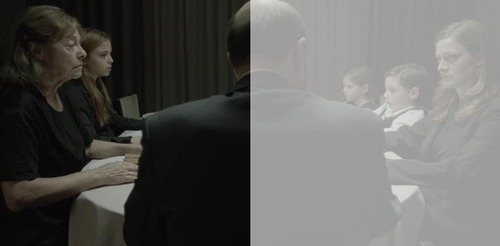STP 2014 / Gabriela Filippi - Miss Violence

Alexandros Avranas’ film MISS VIOLENCE (2013) opens with a beautifully choreographed scene. The members of what seems to be a perfect family of three generations – a mother and a father surrounded by their children, three girls and a boy, and one of their parents, the children’s grandmother – are celebrating one of the girls’ 11th birthday. Dressed up, they are alertly going through all the moments of an ideal birthday party: the cake, the family photo, and then the dancing. Already something is rotten in here. The haste, more than an expression of their joy and impatience seems to testify the characters’ absent minds in relation to the things they are doing. And while the father with his fourteen year old girl are elegantly dancing in the quiet afternoon to Leonard Cohen’s song Dance Me to the End of Love, the eleven year old girl escalades the balcony’s railing and throws herself into the void.
MISS VIOLENCE is built on allusions, almost perversely encouraging sordid speculations to placidly confirm them afterwards. But if the violence in the film hits the spectator so powerfully, that is because Alexandros Avranas’ film does not integrate it rationally as in most films that use a more classical narrative ascribing motivations to the characters. Here, our understanding is undermined by the constant contradictions and the elements the narration chooses to hide. In the opening scene, the man is tender to his alleged wife, seeming to be a caring and kind person, only to treat her brutally in the next scene. Also, all the members of the family bend without hesitations to some absurd rules. Because the little boy is late in preparing his homework, his sister is punished by her father – she has to count the small pine trees from an immense puzzle exposed as a painting on the wall. All this gratuitousness is an affirmation of the fact that the violence is hard to bear just because, in fact, it cannot be justified.
The film came to the 20th Sarajevo Film Festival with a lot of prestige gained already at the Toronto International Film Festival and after winning the Silver Lion for Best Director at the 70th Venice Film Festival. Here it was presented within In Focus, a section reserved for films with a successful festival career.
It is probably the strong comment addressing a precise social issue which differentiates MISS VIOLENCE from the other reputed films of the Greek New Wave such as Athina Rachel Tsangari’s ATTENBERG (2010). Avranas’ film starts as an allegory. The settings are designed in such a manner that they impede determining the exact time of the action. The clothes and the interior of the house, where most of the events shown are taking place, ironically recall the imagery of the 1950s in the US, with its idealized innocence and prosperity. There are also technological devices from later on, but not those of nowadays. The universalized surroundings also help maintain focus on the family’s life, their home’s reality torn from the outside.
But in opposition to this symbolic packaging, at some point the film turns to a realistic convention that reinforces reasoning. Halfway between absurdity and direct social message, it gives this peculiar film a rather singular place in recent Greek cinema.
